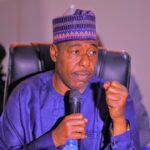Mixed reactions have continued to trail the Borno State governor, Professor Babagana Zulum’s quest to return Internally Displaced Persons (IDPs) to their homes.
Zulum, popularly called the People’s Governor, has, over the last three months, received commendations from citizens of his state and those outside for his doggedness to ensure that Boko Haram terrorists are defeated and peace restored to his state.
- Nigeria @60: Zulum asks Nigerians to be exemplars of patriotism
- Gov Zulum asks FG to invite Chadian soldiers
However, lately, the governor’s efforts seem to be challenged as his convoy has been attacked thrice by insurgents.
While some people expressed reservations, others applaud the governor’s efforts to return the IDPs to their homes.
Before the coming of this administration, major towns and local government council headquarters in the state were at one time or another, taken over by the insurgents, thus IDPs littered Maiduguri, the state capital.
With the relative peace and recapturing of most of the towns, some IDPs from Bama, Gwoza, Mafa, Dikwa, Konduga, Askira/Uba, Ajiri in Mafa have been resettled.
On Friday, September 25, the convoy of Governor Zulum was ambushed by suspected Boko Haram members as he headed towards Baga town, a fishing community to participate in the relocation of IDPs to their communities after years of displacement.
At least, 15 security personnel, comprising the army and police, died following the attack launched on the governor’s convoy.
Two days later, the governor’s convoy was again ambushed by gunmen suspected to be Boko Haram members at Cross Kukawa, when he was departing Baga town in Kukawa Local Government Area.
- We want to return to our communities – IDPs
The chairman of Guzamala IDPs, Umaru Usman, said the situation in the camps was not palatable, saying they were willing to go back to their communities if their safety was guaranteed.
“We are tired of staying in IDPs camps.
“Our desire has been to go back to our homes. We don’t want to be surviving on handouts.
“They should clear the insurgents in the bushes so that we can return to our homes.
“But if it is not safe, we will have no option than to remain in the camp,” he said.
Also speaking, Babagana Kanna, an indigene of Marte Local Government Area, said the insurgents were funding their activities with the money they generated from fishing business.
“The only way to solve our problem is to end this war.
“The northern part of Borno State can feed this nation, and that is what the insurgents are now using against us.
“Our governor is working hard to ensure that people go back to their local government.
“The question that is begging for an answer is: Are these local government areas safe?
“We are tired of the whole drama. The military should just end this war so that we can return to our normal lives.
“Governor Zulum should please sustain the tempo and strive more to restore our dignity.
“We are ready to go back to our communities,”Kanna said.
On his part, Yakura Abubakar, who fled to Monguno from Baga, said she was actually not prepared to return to Baga.
She said in spite of safety assurance from the authorities, there was no certainty on essential services.
“I am not sure if all the teachers would return to schools or those killed were replaced.
“Health officials and other service providers will not return immediately,” she said.
Another displaced person staying with his family in Maiduguri said he left Baga in 2018 and would not return until he was assured of improved civil-military relationship.
Malam Abubakar Na Musamman, who fled Baga after an attack by the Boko Haram in 2014 and took refuge in Maiduguri, said he was willing to return home because it was difficult to earn enough money to live somewhere else.
He said Baga, which used to be the economic heartbeat of the state in terms of agricultural production, was deserted and that even with low market functioning and reduced land cultivation, the fact that the town was located at the shores of Lake Chad makes it attractive.
An analyst, Abubakar Mohammed Kareto, said there were over 800,000 Baga IDPs scattered all over various camps.
“If you look at it critically, they cannot continue to depend on international non-governmental organisation and others for food.
“Government has to create an opportunity for them to go back to their communities and continue with their farming and other activities.
“The major challenge is the issue of safety. Sometime ago, locals were resettled in Guzamala, but they were sacked few days later by same Boko Haram.
“We don’t want the same situation to happen. However, the situation is still as bad as anyone can imagine.
“There is serious politics and conflict of interest on Baga town, probably due to its economic importance.
“The governor, who is the state chief security officer, once expressed reservation that despite the deployment of numerous security operatives, the town is still unsafe,” he said.
- Our take on Baga – Security operatives
A security personnel in Maiduguri, who does not want to be named, said the attack carried out by the insurgents was irregular, especially along the roads, and “no one can guarantee the safety of returnees.”
The operative, who was in the fleet of government officials attacked by the insurgents on their way to Baga, said Marte and Baga towns were safe for the civilians to return because the Multinational Joint Task Force had its headquarters and operational base in Baga, while Marte, which was once declared a caliphate by the insurgents, had an army brigade.
He said displaced persons would face ‘serious’ challenges because the insurgents launched attacks on travellers along Monguno to Baga road and between Nganzai and Monguno daily.
He said it was not possible for travellers to get escort frequently from Baga to other towns, thus; people going to other places for businesses have to wait until they get an escort.
“Even the security personnel attached to important personalities are not hundred per cent safe, that is why most of them work with their hearts in the mouth.
“Two days ago, troops were attacked on their way from Marte.
“My colleague was wounded in the attack,” he said.
He said troops and other security personnel would provide adequate protection to the civilian population in all the liberated territories.
Another security officer said people were free to return to their towns but have to be vigilant, adding that majority of the attacks were carried out with the help of moles.
He said the recent attacks on the governor’s convoy were meant “to show the public that they could outdo troops, which in reality is not possible.”
Governor Zulum had told a delegation of the Nigerian Governors Forum (NGF), led by its chairman and governor of Ekiti State, Kayode Fayemi, that government resolved to move displaced persons back to their ancestral homes following the return of peace to enable them to get back on their feet.
He said widespread unemployment among the displaced persons was causing more harm to the state, adding that the state had a population of six million people, out of which close to 90 per cent relied on relief supplies.
He said the citizens were dependent on “all sorts of aids, and that is why insurgency is increasing in the state. And there is an increase in unemployment.
“That has informed the decision of the government to look into the possibility of returning people to their ancestral homes where they should have access to agricultural lands.”
The governor said Lake Chad shores hitherto provided employment opportunities for about 10 million Nigerians, but unfortunately, all the farmers were displaced by insurgents.
The Sambisa Game Reserve and Mandara mountains, which provided employment opportunities to three million people have been deserted, the governor also said.
- Borno: 43 soldiers, 12 policemen killed in 4 months
Boko Haram insurgents have killed at least, 43 soldiers and 12 policemen in a series of deadly attacks launched across Borno State over the last four months according to library data collated by Daily Trust.
The data also indicated that 17 soldiers were injured in the attacks.
The attacks by the Boko Haram insurgents were carried out mostly in Damboa, Magumeri, Kaga, Mainok and Kaga areas of the state.
On June 17, Boko Haram attacked military operatives along Damboa/Maiduguri highway in Damboa LGA during which 9 soldiers were injured.
In the same vein, an attack by Boko Haram at Mainok on July 6 led to the death of one soldier.
On July 7, the insurgents carried out another attack against the military along the Damboa/Maiduguri highway which led to the death of 20 soldiers.
In an attack at Mainok on July 13, 4 soldiers were killed while another attack on Kukawa led to the death of 8 soldiers with three others sustaining injuries.
On September 1, Boko Haram attacked Magumeri Military Base killing 9 soldiers in the process.
An attack at Sabon-Gari Wajuriko Village in Damboa LGA on September 20, left one soldier dead while on September 25, Boko Haram killed 5 soldiers and 12 policemen in another attack along Monguno-Baga axis of the state.
On September 29, suspected insurgents killed 11 soldiers along Marte-Dikwa highway.

 Join Daily Trust WhatsApp Community For Quick Access To News and Happenings Around You.
Join Daily Trust WhatsApp Community For Quick Access To News and Happenings Around You.


